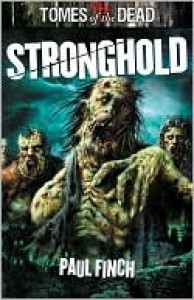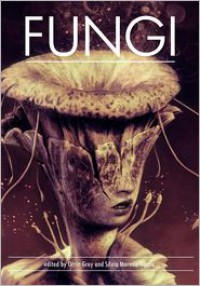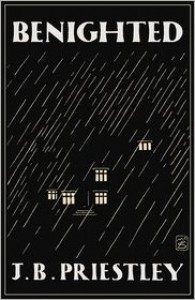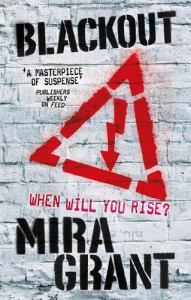Currently reading
Near + Far
Amigurumi Knits: Patterns for 20 Cute Mini Knits
Metro 2033
Southern Gods
Masterpieces of Terror and the Supernatural
Howdunit Forensics
Garnethill
The Autopsy and Other Tales
Alice Hearts Welsh Zombies
Blood & Water
Darwin's Nightmare
 A bit didactic at times, and not a particularly sympathetic protagonist, which made it a bit less exciting than it could have been. Still, solidly plotted, and decent pacing.
A bit didactic at times, and not a particularly sympathetic protagonist, which made it a bit less exciting than it could have been. Still, solidly plotted, and decent pacing.
 Partway through (p 204), and am finding that it's rather less horror/ghost story and more Harry Potter-ish than I was hoping. Finding protagonist a bit unlikeable, much like Coraline in the Coraline movie. Pictures are neat, but the two kids dressed up in the odd costumes which are supposed to be really creepy aren't creepy to me. Still, not bad; expect to finish it in a day or so.
Partway through (p 204), and am finding that it's rather less horror/ghost story and more Harry Potter-ish than I was hoping. Finding protagonist a bit unlikeable, much like Coraline in the Coraline movie. Pictures are neat, but the two kids dressed up in the odd costumes which are supposed to be really creepy aren't creepy to me. Still, not bad; expect to finish it in a day or so.(Have my suspicions about who we will find out they are, later. >.> )
========
Sadly disappointed at the lack of follow-through on the two "horribly creepy" kids. Oh well. Estimation of it being finishable in a day or so was pretty spot-on, I just took a break in the middle.
Find the protagonist somewhat annoying, but tolerably so. The extent to which this is part of a series cannot be underestimated. Kind of curious about where it's going, may pick up the next one, but won't be watching for it.
Post Mortem
 Honestly, I found the quality of this to take a sharp rise partway through, so much so that I'm wondering if it was more my mood than the quality of the stories--seems unlikely that all the less good stories were clumped in one section, you know?
Honestly, I found the quality of this to take a sharp rise partway through, so much so that I'm wondering if it was more my mood than the quality of the stories--seems unlikely that all the less good stories were clumped in one section, you know?That said: particularly fond of Ramsey Campbell), and P. W. Sinclair's "Getting Back" (apparently the author's only fiction credit at the time; they're listed as a humour columnist. I am saddened, as I would very much like to read more of their fiction). Worth at least checking out.
Tik-tok
 Picked this up while browsing though my library today, and went through the whole thing again this morning. I've read it before, and it's as weird and funny and awful as I remember - a quality I can only call "wacky", the giddiness of [a:Harry Harrison|16147|Harry Harrison|https://d202m5krfqbpi5.cloudfront.net/authors/1196199650p2/16147.jpg]'s [b:The Stainless Steel Rat|64394|The Stainless Steel Rat (Stainless Steel Rat, #1)|Harry Harrison|https://d202m5krfqbpi5.cloudfront.net/books/1328073906s/64394.jpg|824589] books, or possibly of [a:Jhonen Vasquez|55743|Jhonen Vasquez|https://d202m5krfqbpi5.cloudfront.net/authors/1239072658p2/55743.jpg]'s [b:Johnny the Homicidal Maniac: Director's Cut|8466869|Johnny the Homicidal Maniac Director's Cut (Hardcover)|Jhonen Vasquez|https://d202m5krfqbpi5.cloudfront.net/books/1276707699s/8466869.jpg|93408].
Picked this up while browsing though my library today, and went through the whole thing again this morning. I've read it before, and it's as weird and funny and awful as I remember - a quality I can only call "wacky", the giddiness of [a:Harry Harrison|16147|Harry Harrison|https://d202m5krfqbpi5.cloudfront.net/authors/1196199650p2/16147.jpg]'s [b:The Stainless Steel Rat|64394|The Stainless Steel Rat (Stainless Steel Rat, #1)|Harry Harrison|https://d202m5krfqbpi5.cloudfront.net/books/1328073906s/64394.jpg|824589] books, or possibly of [a:Jhonen Vasquez|55743|Jhonen Vasquez|https://d202m5krfqbpi5.cloudfront.net/authors/1239072658p2/55743.jpg]'s [b:Johnny the Homicidal Maniac: Director's Cut|8466869|Johnny the Homicidal Maniac Director's Cut (Hardcover)|Jhonen Vasquez|https://d202m5krfqbpi5.cloudfront.net/books/1276707699s/8466869.jpg|93408].Terrible things happen in this book. It's horribly entertaining.
 Wow, this was a quick read.
Wow, this was a quick read.Honestly? The movie was better. The writing style feels a little dated, and I've discovered I don't love Bloch's novels. His short stories are another matter; he's creepy and funny and perhaps a touch grandiose in a throughly enjoyable way those. His short stories all deserve to be read aloud by Vincent Price. But his novels? Eh.
(Warning for individuals familiar with psychology, in a way the audience of 1959 perhaps was not: you may be tempted to toss the book gently against the wall at one point. Jesus. ...a more horrifying thought is that the way things are discussed is the way they were actually understood at the time, which just... Anyway. Moving on!)
On the plus side: coherent plot, decent characterization, some really unsettling looks into Norman's can-of-worms mind. If it were a little (a lot?) longer, it'd be coming out as a summer slasher blockbuster read. Not bad, just not great.
 (NOTE: despite matching ISBNs, the edition I own was published by Abbadon Books and has a different cover.)
(NOTE: despite matching ISBNs, the edition I own was published by Abbadon Books and has a different cover.)It was okay. On the plus side, a descriptive style that actually made zombies on their own creepy again (which is pretty rare; usually I find it's what they do, or what people do in reaction to them, that's the source of chills), and a fast-moving plot. I am not up on medieval siege weaponry, and I never got bored or felt I was being told something irrelevant.
Downsides: found the gore to get a bit overbearing after a while, and the pacing sometimes feels choppy.
Wod the Harvesters
 The good: mostly the second adventure, "Chicago Workings". Faintly reminiscent of [b:Our Lady Of Darkness|102267|Our Lady Of Darkness|Fritz Leiber|http://d.gr-assets.com/books/1209743011s/102267.jpg|288561], this one contains enough of an outline in sacred geometry to fake it for the story (you don't need much), interesting ideas, and suitably creepy bad guys. The antagonist feels a little blankly indifferent to the PCs, but that can work.
The good: mostly the second adventure, "Chicago Workings". Faintly reminiscent of [b:Our Lady Of Darkness|102267|Our Lady Of Darkness|Fritz Leiber|http://d.gr-assets.com/books/1209743011s/102267.jpg|288561], this one contains enough of an outline in sacred geometry to fake it for the story (you don't need much), interesting ideas, and suitably creepy bad guys. The antagonist feels a little blankly indifferent to the PCs, but that can work."The Harvesters" was alright, solid construction and antagonists, but I felt it was a bit facile at times. Would have loved a little more character development on some of the bad guys, and the ghost.
Finally, the editing was painful. It's less jarring in instructions than in a fictional narrative, which is what you can consider most of the book, but it's still really annoying; in the end, this was what had me drop the book from three stars to two.
 Dammit, a glitch ate my review.
Dammit, a glitch ate my review.Short version: lovely measured understatement of what the antagonists are (huge credit for not using it as a Dramatic Reveal), really neat and sadly plausible plotting, a couple of points that were addressed I wish had been addressed earlier, looking forward to the next one.
 A much wider range of stories than I was expecting. You've got some classic fungus/body horror and some sad tales of personal darkness, but there's also Victorian bio-engineering, weird Westerns, dark comedy, science fiction that puts the mushrooms in a very different role from what I was expecting, high fantasy (the old stuff), cross-sections of neighbourhood life that take a dark turn, mind-altering alien invasion, poetry...
A much wider range of stories than I was expecting. You've got some classic fungus/body horror and some sad tales of personal darkness, but there's also Victorian bio-engineering, weird Westerns, dark comedy, science fiction that puts the mushrooms in a very different role from what I was expecting, high fantasy (the old stuff), cross-sections of neighbourhood life that take a dark turn, mind-altering alien invasion, poetry...I'm sitting here looking over the table of contents, and I really don't think I can do justice to the scope of the stories, here; the variety of style and topic is honestly surprising, even as the quality is consistently high. A couple of them didn't blow me away, but all that means is that when presented with twenty-seven stories, the worst thing I can possibly say about one or two of them is "well-written, not to my personal taste".
(I've made sure the official URL to the book is included in the Goodreads information for all three editions, so you could be reading the ebook in less time than it takes you to finish this review. Just saying.)
Some particular favourites of mine, that make me want to see what else the authors have done:
Last Bloom on the Sage, by Andrew Penn Romine. A dynamic weird Western; I look at what it does for the Wild West and I'm reminded of what Elizabeth Bear and Sarah Monette did for spaceships and space stations with "Boojum" and "Mongoose".
Goatsbride, by Richard Gavin. A rich, dark tale of horror where the fungus meshes with human evil and an ancient monster. Makes me think of the best of what I used to love about the old Pan Book of Horror Stories collections.
Tubby McMungus, Fat From Fungus, by Molly Tanzer. A pair of cheerfully dastardly thieving protagonists on the trail of a lost book. Prompted a very odd late-night conversation. (hardcover only)
I really have to say I've trimmed this list down hard--I stopped and went back over it when I realized I was in danger of mentioning half the stories in the anthology. Honestly, there isn't a bad one in the bunch; I think this is the best anthology (for style, quality, and variety) I've seen in ages, and really recommend picking it up.
 1
1
 ...dammit, Goodreads needs more stars. Or half-stars. Because my practice of reserving five stars for "everyone should read this, regardless of genre preference" and four stars for "everyone with an interest in this genre should read it" is starting to get a bit awkward.
...dammit, Goodreads needs more stars. Or half-stars. Because my practice of reserving five stars for "everyone should read this, regardless of genre preference" and four stars for "everyone with an interest in this genre should read it" is starting to get a bit awkward.Okay! This book. A bit clunky in spots; some of the world-building and stage-setting could have come in a bit more smoothly, but that feels like first-novel jitters at worst, and I am looking forward to the next books. (Also to picking up his short story collection, although yeep my reading backlog.) It's sword and sorcery in a way that doesn't make me groan, with the characters quite reasonably getting drawn into a fight against evil, and a world that's much less black-and-white than I realized.
The characters, on that topic, were wonderful. There are two heroes who are traditional high-fantasy gifted teenage protagonists, and that's out of five, and there is a great deal of point and counterpoint and actual plausible real-world disagreements and no one person who's actually definitively right. I was really glad to see that.
I was not expecting the ending. That was nice. ...that was actually really nice; I thought I'd pegged the villain a couple of times, and I was fairly wrong (that is, wrong because I was actually wrong, not because there was an attempt to set it up to look like someone innocent was the villain) each time.
I want to see what happens next.
 Honestly, with the tagline "There are only thirteen bullets between the world you know and the world they rule", and the dramatic final fight scene, I am getting the impression that this was an expanded short story.
Honestly, with the tagline "There are only thirteen bullets between the world you know and the world they rule", and the dramatic final fight scene, I am getting the impression that this was an expanded short story.The idea of how vampirism is transmitted is new and really damn smart. Once you're infected by vampirism in potentia--which depending on the power of the vampire can be done in a variety of ways; the particularly old or strong ones can apparently do it at will by making eye contact--then you become a vampire *if you kill yourself.* And the vampire having its hooks in your brain may hurry this process along; they can inflict horrible dream sequences which start to make suicide and vampirism seem very appealing. Ties into the old suicide legends; maintains the concept of infection; gets rid of the "doesn't everyone a vampire kills become a vampire" thing, which incidentally is probably a useful thing as the vampire in question are really horribly brutal.
(The book runs with an alternate history--one in which vampires have always been known to exist, but were beaten back. They're currently thought to be extinct in the wild--the book suggests a setting where one pops up somewhere in the world perhaps once every decade or two.)
There are also half-deads--zombie bodies, coherent minds--that have been fed vampire blood and are loyal to the vampire, right up until they fall apart. (There's an implication that vampires don't have to create half-deads out of the living; at one point Scapegrace[1] quickens (awakens, enlivens) a newborn's skull and hands it to someone, simply so he doesn't have to watch them closely--if they don't cradle it in both hands, it will start screaming. However, that might've been something rather slightly different. I don't mind not getting a catalog power listing.)
However. The book presents vampires as being tougher in direct proportion to how much blood they've drunk--I believe the phrase "so full of blood a bazooka couldn't hurt him" is applied to a vampire who's gorged on four or five people at one point. Similarly, the climactic fight scene involves a vampire who's fed so well that she's completely ignoring bullets fired at her heart from point-blank range. And yet this vampire is defeated by being tripped through a window (okay) which then shatters and cuts her to pieces (what?), causing her to lose so much blood that our protagonist can stab her through the heart several times with a jagged metal rod, killing her.
Given how hard that fight was played up, I felt rather cheated.
---
[1] Have I mentioned how much I love this name? It's not Gabriel Grey, but it's damn good.
Streets of Bedlam: A Savage World of Crime + Corruption
 The good:
The good:A game for when you feel like sitting around with friends and playing through a decent neo-noir or crime movie, instead of sitting down to watch one. What's not to like?
The writing's very evocative; snappy and slick, it's really suited to the dirty setting. Do bad things for good reasons; it's a good summary and a great character motivation, and everything seems set up to let you do exactly that. On top of the Savage Worlds system (which I'm a longtime fan of), Streets of Bedlam builds some really lovely setting-specific rules on top of it--I'd consider cribbing the crime scene rules for nearly any investigative setting. There's a very well-detailed starting adventure, a handful of adventure seeds, and dozens of characters--highly detailed archetypes, decently outlined major players, and a ton of quicker NPCs.
It's also very user-friendly for someone looking to run the game, with advice on how to set up an adventure, what to aim for in a scene, how to trim unnecessary details, how to balance player involvement for different patterns of scene-running, card-based ways to whip up a crime story... seriously, I would loan this book to nearly anyone looking for advice on running a dynamic game.
I want to play, dammit.
The bad:
Glitchy editing. I can forgive a few typos, and I'm not getting snippy about turns of phrase--I'm still grinning a bit over "Thomas takes off like a bat out of similes". But there are sudden name changes for characters, sentences that don't make sense although you can figure them out from context ("Florence knows anything about anyone or anything else"), some punctuation sneezes...
Streets of Bedlam is a cinematic game, and it's a good one. But these lines are like catching a scene where the actor playing a down-and-out guy living in a cardboard box checks his smartphone in between answering questions.
The verdict:
With everything else this book has going for it, it's not quite enough to knock it down to three stars--but it was close. Hope the next edition tidies up a bit.
Meanwhile, I'm gonna go put Five-Story Drop on my wishlist. I hear it's coming out soon.
Benighted
 Of all things, I'm reminded of [b:Of Human Bondage|31548|Of Human Bondage|W. Somerset Maugham|http://d.gr-assets.com/books/1347260157s/31548.jpg|2547187]; there's a certain compelling unhappiness to Penderel and the Wavertons, a mannerly sorrow. It felt like watching classic horror/suspense, but there's a lot of development that I wouldn't expect to be given the same weight on film; I'm curious to see the movie, now, and may catch it for the Feast of the Long Shadows.
Of all things, I'm reminded of [b:Of Human Bondage|31548|Of Human Bondage|W. Somerset Maugham|http://d.gr-assets.com/books/1347260157s/31548.jpg|2547187]; there's a certain compelling unhappiness to Penderel and the Wavertons, a mannerly sorrow. It felt like watching classic horror/suspense, but there's a lot of development that I wouldn't expect to be given the same weight on film; I'm curious to see the movie, now, and may catch it for the Feast of the Long Shadows.I found the denouement a bit abrupt, but I think if it had actually been played out I would have found it dragged on (actually, if it had played out, that bit alone would have been a fairly standard modern horror movie except so many people survived).
Lovely writing, characters I liked, tension, creepiness, hope, sorrow. What's not to like?
 It's not quite weird fiction; it has none of the unreality I associate with that term. It's horrific in spots, but it's much quieter than a lot of the horror I read. It's too contemporary, in feel and narrative rather than in setting, to be a classic ghost story.
It's not quite weird fiction; it has none of the unreality I associate with that term. It's horrific in spots, but it's much quieter than a lot of the horror I read. It's too contemporary, in feel and narrative rather than in setting, to be a classic ghost story.But damn, it's good.
I'm reminded of Stephen King's strange small towns--Wink is much more idealized than Derry or Castle Rock, which have their dark little knots; but then again, its idealization is part of the horror. And I'm reminded of Neil Gaiman. I'm not a huge Gaiman fan, usually; I tend to find his work more glossy than touching. But he does have some lovely things to say about the little horrors of family and expectation, and he writes those things large and strange, and that definitely happened here. (I'm not trying to say that the book's derivative! I'm trying to explain what appeals by drawing comparisons.)
Sometimes it seems like there are half a dozen threads of story (particularly towards the end, when the nature of Wink is being illustrated), but it's never fractured; someone called it sprawling, and I think that suits. It's well-written (it really is), calmly voiced, and while I wish that there was a little more of it (and we're talking about a 662-plus-backmatter pound-and-a-half trade, here) I am very happy that I read it.
 Someday I will get through a Mira Grant book (or possibly a Newsflesh book; my experience of the the two groups has had 100% overlap until now) without getting weepy. That day, kinda unsurprisingly, is not today.
Someday I will get through a Mira Grant book (or possibly a Newsflesh book; my experience of the the two groups has had 100% overlap until now) without getting weepy. That day, kinda unsurprisingly, is not today.I dragged my feet on reading this book for a long time (a tendency I have noticed in myself when I don't want something to end). I'm very glad I finally read it, and I wish I'd done it sooner, and dammit it is hard to discuss these without spoilers. In the absence of spoilers, there is really not much I can say.
That said:
* As always, the epigraphs are brilliant; the ones before Chapter Thirty-Six are my favourites. The moment where the epigraphs of certain characters stop being marked as "unpublished" made me want to cheer.
* This book has made me think I need to revisit [b:Watchmen|472331|Watchmen|Alan Moore|http://d.gr-assets.com/books/1327866860s/472331.jpg|4358649] and call for a bit more accountability from certain characters. I suspect it will make me angrier with the story. That's okay.
* Much love for the recognition of the cold equations.
It's a good weepy, and it's been a fine trilogy to read.Because we chose to tell the truth
(The cool of age, the rage of youth)
And stand against the lies of old
(The whispers soft, the tales untold)
We find ourselves the walking dead
(The loves unkept, the words unsaid)
And in the crypt of all we've known
(The broken blade, the breaking stone)
We know that we were in the right
(The coming dawn, the ending night).
So here is when we stop the lies.
The time is come. We have to Rise.













